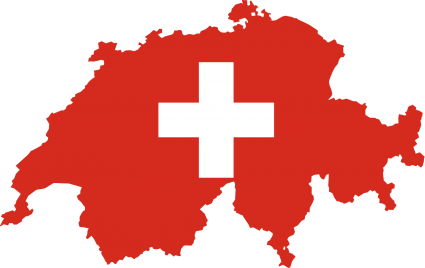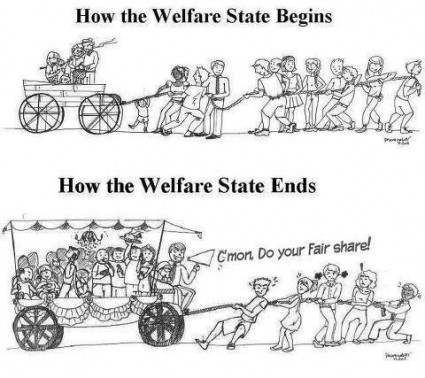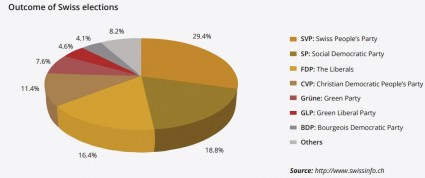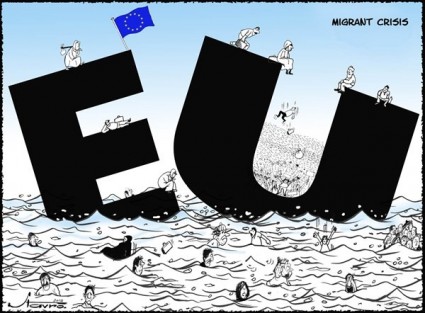December 18, 2015
By: Claudio Grass, Global Gold Inc.
Concerns over Immigration Motivated Voters – Relations with the EU may come under Severe Strain
 On October 18th, the Swiss went to the polls to cast their votes in the country’s parliamentary elections. The right-wing triumphed as the Swiss Peoples’ Party or SVP won 29.4% of the vote. The papers described it as “the best performance by a party in at least a century”. The Free Democratic Party (FDP) also gained, winning 16.4% of the vote. In terms of the number of seats, the Swiss Right secured 14 new seats (11 from the SVP’s gains alone) to reach a total of 98 seats (65 for the SVP).
On October 18th, the Swiss went to the polls to cast their votes in the country’s parliamentary elections. The right-wing triumphed as the Swiss Peoples’ Party or SVP won 29.4% of the vote. The papers described it as “the best performance by a party in at least a century”. The Free Democratic Party (FDP) also gained, winning 16.4% of the vote. In terms of the number of seats, the Swiss Right secured 14 new seats (11 from the SVP’s gains alone) to reach a total of 98 seats (65 for the SVP).
A landslide victory for right-of-center parties in Switzerland
The political climate in Switzerland was strained and the electorate was concerned about the issue of immigration and the rush of asylum seekers to Europe, even though Switzerland has not seen a similar flow of refugees or migrants as others on the continent. The media described voters as being motivated by fear, which is true to a certain extent, but it was also about securing their Swiss culture and its identity.
It also showed that the Swiss people don’t like centralization and understand that by voting for the SVP they are sending a clear statement to political parties that still want to delegate Swiss sovereignty to the EU. The SVP’s election campaign slogan describes it best: “Stay Free!” Throughout its campaigns, the Right stressed the importance of identity, and that following EU diktats would violate Switzerland’s independence.
What Does This Mean for the Swiss?
The outcome of these elections should not come as a surprise. The public had previously voted in favor of a referendum to impose immigration quotas, a popular initiative that was spearheaded by the SVP. This is the second time that the Swiss have had their say on immigration and have rejected EU measures on the matter. This makes it crystal clear that, to the Swiss, their cultural identity is more important than any political relationship, even to the EU.
The outcome has nothing to do with xenophobia. For the past 100 years, 15% to 25% of the Swiss population has been comprised of foreigners. This makes us one of the countries in Europe with the highest share of foreign inhabitants. However, the Swiss also realized that 60% of the social welfare granted in our country is going to people who immigrated to Switzerland – and some Swiss believe they shouldn’t be subsidizing immigrants. Further leniency on matters of immigration and compliance with the EU’s wishes would risk the stable political and economic environment in which the Swiss are living, in addition to disturbing the population’s social cohesion.
However, the Swiss are not only expressing their loyalty to their Swiss cultural identity in political venues. They are also seeking to codify this into law! The referendum on immigration and the recent parliamentary election illustrate that there is recurring tension between the laws and regulations of the EU and the laws and the political will of the Swiss. They are now proposing an initiative to give Swiss law precedence over international law, which constitutes an open challenge to the international courts. The Swiss message is loud and clear.
Is Switzerland Moving Toward the Right?
What does that mean? It appears that the political orientation of Switzerland will shift from center-left to the Right. This is a major departure and implies a significant change in how politicians will manage this country. But what does it really mean? Why does this even make sense in connection with the election result?
My own interpretation of Left versus Right, is that on the Left we have the totalitarian state. It can be socialist, fascist, communist, imperialistic, nationalist, or a number of different combinations. I still have to remind people from time to time, especially when they call the Nazis right-wing-extremists, that in fact the Nazis were socialist.
A tramway in Baden in the early 1930s, sporting an election ad for the Nazi party. What does “NSDAP” actually stand for? It means “Nationalsozialistische Deutsche Arbeiterpartei”, or “National Socialist German Worker’s Party”. In other words, the facists never made a secret of the fact that they were really socialists – they only thought they were “better” socialists than the Marxists. Once they came to power, they promptly erected a command economy in all but name – which Mises called the “Zwangswirtschaft” (literally: “the coerced economy”).
The more you move toward the Right, the more you believe in reducing state intervention, eschew progressive thinking, adopt more conservative, traditional values and believe in more individual freedom.
To better explain this, we refer to the writings by libertarian theorist Hans-Hermann Hoppe. The Right recognizes that humans are different and diverse, whether mentally, intellectually or physically. Differences are not only what we are ‘born with’, but it also means differences in how we live, such as level of income, social status, property ownership, even political influence. These differences should be accepted and respected.
Economist, libertarian and anarcho-capitalist theorist Hans-Hermann Hoppe
The Left, on the other hand, finds that there are no ‘natural’ differences between people. In other words, we are all equal. But according to Hoppe, we cannot be all equal. We are different in every sense. More importantly, it not only goes against the concept of private property, it is a cause of conflict in society. As Murray Rothbard put it:
“Since no two people are uniform or ‘equal’ in any sense in nature, or in the outcomes of a voluntary society, to bring about and maintain such equality necessarily requires the permanent imposition of a power elite armed with devastating coercive power.”
What this means is that in order to ensure equality, you need a higher power that imposes it, even if this were violate respect for private ownership. How is this compatible with a free society? It is not compatible, argues Hoppe. In fact, it is unrealistic and “out of touch with reality”.
Let us focus more closely on the main topic in these elections, which was immigration. Where do the two sides stand on the issue? Hoppe explains that the Left is in favor of ‘free and non-discriminatory’ immigration, which is consistent with their belief that ‘we are all born equal’. The world belongs to all of us, with open frontiers and there should not be any restrictions. In contrast to the free access professed by the Left, the Right says: No one has the right to enter into my private property. Hoppe best explains this in the following passage:
“In a world where all places are privately owned, the immigration problem vanishes. There exists no right to immigration. There only exists the right to trade, buy or rent various places. Yet what about immigration in the real world with public property administered by local, regional or central State-governments?”
Immigration is not an entitlement, it is granted if allowed by the citizens of the country. So what would motivate a country like Switzerland not to open its borders? One reason is to protect the cohesion and stability of its society, which can be compromised with the constant entry of new immigrants, with scarce resources having to be shared by an increasing number of people.
Not only does it mean that some will gain at the expense of others, but the general level of affluence and the economic standard of the country will be affected. What if we look at it in terms of the bigger picture and don’t limit this to Switzerland? If Europe opens its borders while maintaining its current welfare system, you can be sure that the continent will effectively collapse within a short period of time.
The migrant crisis is already dividing the EU, as all member states and their citizens fear its costs (in more than one sense). It is a statistically provable fact that the vast bulk of asylum seekers is still without regular employment five years after arriving and therefore dependent on welfare handouts. In some cases, “vast bulk” actually means “almost all of them” (e.g., a study found that nearly all immigrants from Chechnya, Somalia and Afghanistan living in Vienna are on the welfare rolls, regardless of when they arrived in the country).
We are Heading Toward a More Decentralized and Conservative Government
This great win for the Swiss Right has put additional pressure on the political future of Finance Minister Eveline Widmer-Schlumpf, particularly after her center-left BDP-Party won only 4.1% of the vote. She has been a member of the Swiss Federal Council since 2008 and served as President of the Swiss Confederation in 2012.
Adios, Eveline: Swiss center-left finance minister Eveline Widmer-Schlumpf.
As Finance Minister, Widmer-Schlumpf was involved in high-profile policy decisions, such as the 2008 bailout of UBS, Switzerland’s largest bank, that was at risk of bankruptcy due to its overexposure to the U.S. subprime market, an action the public criticized as representing fiscal overstretch and being unconstitutional. She also gave in to international pressure to share bank account information regarding Americans. This was a dramatic departure from the Swiss tradition of banking secrecy, which was codified into law in 1934.
The 2015 elections were an opportunity for the public to express its disapproval of Ms. Widmer-Schlumpf. And so she believed that the only option she had was to no longer stand for reelection to the cabinet and to resign instead, as the country settles for a new policy direction.
However, it is not entirely over yet. The October elections not only involved voting on the 200 seats in the National Council, or lower house of parliament, but the Swiss also voted for the 46-seat upper chamber or Council of States. The results of this part of the election will be announced at the end of November. The country also awaits the ballot of December 9th electing the members of Switzerland’s Federal Council, which will be conducted after negotiations between party members in a combined vote of the National Council and Council of States.
Swiss Direct Democracy Trumps the Parliamentary System
The public has lost faith in statist and leftist policies. We expect to see a significant shift in the country’s policy direction, especially if the SVP and the FDP manage to gain a majority in the Federal Council. Should that be the case, we can expect a change towards less statist and more conservative policies.
However, there is another interesting aspect that is worth mentioning. The voter turnout in these elections was about 48%, compared to 56% in the referendum on immigration in 2014. We are not downplaying the importance of the parliamentary vote, but we can infer that the Swiss are aware of the power of their vote in a referendum.
The difference is that their vote is cast directly on the question at hand. The Swiss political system keeps elected politicians under the scrutiny of the public. The citizen does not exclusively rely on his/her elected representative, but the citizen is entitled to put every law to a general vote.
Switzerland is a clear anomaly in our current global system, which can by and large be considered ‘progressivist’. Progressivists are liberals who argue for an expanded role of the government. But how are these two compatible? They were back in the 1800s, when people believed that the government’s role was to protect individuals’ rights.
However, progressivists later also added the task of ensuring the economic welfare of citizens. The true outcome, however, was the reality that we live in today. People’s choices are now largely dictated by state-directed wealth redistribution. The outcome of the elections is definitely a positive development for the country. It is also a sign that the people have grown more aware that leftist and statist policies have failed to work.

Yes, Switzerland is moving in the ‘Right’ direction!
Chart by Swissinfo.ch
Image captions and editing by PT
This article by Claudio Grass originally appeared in the newest Global Gold Outlook Report . You can subscribe for future updates at www.globalgold.ch
To read more about holding physical gold outside the banking system and the solutions offered by Global Gold, please visit http://bullion.acting-man.com/outside_the_bank and request an investor kit for free.
About the author: Claudio Grass is a passionate advocate of free-market thinking and libertarian philosophy. Following the teachings of the Austrian School of Economics he is convinced that sound money and human freedom are inextricably linked to each other.






